Noun Study Guide
A noun is a word that names a person, place, thing, or idea. Nouns are the building blocks of sentences and are essential for communication in the English language.
Types of Nouns
There are several types of nouns:
- Common Nouns: These are general names for people, places, things, or ideas. For example, "dog," "city," "book," "happiness."
- Proper Nouns: These are specific names for people, places, or things and always begin with a capital letter. For example, "John," "Paris," "The Eiffel Tower," "Coca-Cola."
- Concrete Nouns: These are nouns that can be perceived by the five senses. For example, "apple," "table," "flower," "music."
- Abstract Nouns: These are nouns that represent ideas, emotions, or concepts. For example, "love," "freedom," "honesty," "peace."
- Collective Nouns: These are nouns that refer to a group or collection of people or things. For example, "team," "herd," "family," "audience."
Study Tips for Nouns
Here are some tips to help you understand and identify nouns:
- Practice identifying nouns in sentences by looking for words that name people, places, things, or ideas.
- Use flashcards to memorize different types of nouns and their examples.
- Read books and highlight or underline the nouns you come across to practice recognition.
- Play noun-themed games such as noun bingo or noun scavenger hunts to make learning fun.
Examples of Nouns
Here are some examples of nouns in sentences:
- The dog chased the cat up the tree.
- Paris is known for its beautiful architecture.
- I read an interesting book about space exploration.
- Her smile brightened the entire room.
[Noun] Related Worksheets and Study Guides:
.◂English Language Arts Worksheets and Study Guides Third Grade. Capitalization/Punctuation
Study Guide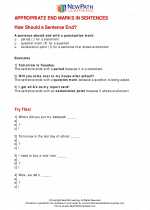 Capitalization/Punctuation
Capitalization/Punctuation  Worksheet/Answer key
Worksheet/Answer key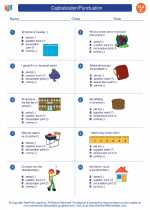 Capitalization/Punctuation
Capitalization/Punctuation  Worksheet/Answer key
Worksheet/Answer key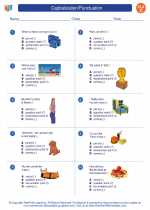 Capitalization/Punctuation
Capitalization/Punctuation  Worksheet/Answer key
Worksheet/Answer key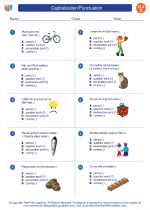 Capitalization/Punctuation
Capitalization/Punctuation  Worksheet/Answer key
Worksheet/Answer key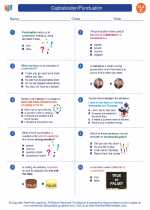 Capitalization/Punctuation
Capitalization/Punctuation  Worksheet/Answer key
Worksheet/Answer key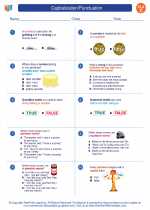 Capitalization/Punctuation
Capitalization/Punctuation  Worksheet/Answer key
Worksheet/Answer key Capitalization/Punctuation
Capitalization/Punctuation 

 Worksheet/Answer key
Worksheet/Answer key
 Worksheet/Answer key
Worksheet/Answer key
 Worksheet/Answer key
Worksheet/Answer key
 Worksheet/Answer key
Worksheet/Answer key
 Worksheet/Answer key
Worksheet/Answer key
 Worksheet/Answer key
Worksheet/Answer key

The resources above cover the following skills:
Controlling Language
Apply standard English punctuation and capitalization in written language
Use end punctuation correctly